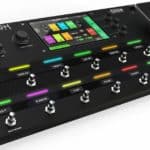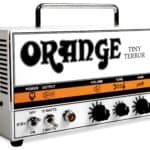You might have heard it somewhere:
“Tone is in the fingers”
But what does that really mean?
Are your fingers born with it?
Can you improve on it?
Does gear not matter at all then?
Well, here’s a short answer so you don’t freak out:
The expression “Tone is in the fingers” means that no matter the guitar rig a player uses, what ultimately determines the quality of the sound is how skillful he or she is. Tone being in the fingers is an oversimplification of the concept that a player’s ability has more impact on tone than gear.
In this article, I will go in-depth about why many people swear that tone is in the fingers, and try to explain what they really mean when they say it.
After leaving this page you will have a clearer idea of how much your fingers influence the sound your guitar makes, and probably, and also I will give you some tips on how to improve your overall tone.
So, this is a win-win situation.
Are you ready to get started?
Let’s go!
What is guitar tone actually?
Tone is a concept that many beginners might find confusing.
But be not afraid.
To make things simple, when gearheads talk about “tone” they refer exclusively to how a guitar sounds, qualitatively.
And most likely, the concept expands to the whole guitar rig, this meaning how the conjunction of a guitar, some effects, and an amp sound.
The thing is, in this equation, we might be leaving an important link of the guitar playing chain out.
Have you noticed it?
All those things mentioned before won’t make a sound unless a player is playing them.
So, the idea of fingers being a fundamental part of what makes guitar tone is not so wild after all.
What defines the tone of a guitar?
Every little aspect you can imagine defines the tone of a guitar, and even those you can’t imagine also do.
The reasonable thing, however, is to focus only on the most influential ones.
Thankfully, to guide you through this madness, I’ve written this other article:
I really think you should check it out if you are interested in this.
But, to be brief, many components such as tonewoods, pickups, frets, and even construction types have a serious say on the final sound.
Of course, the rest of the rig where the signal travels also has a very big impact.
Finally, the player, and how he or she approaches the instrument also take a big role in defining tone.
Why do many people say that tone is in the fingers?
Many people claim that the tone is in the fingers because it kinda is… really.
Let me explain.
As much as you or I spend on the fanciest guitar ever, to pair it with the most boutique reissue of the most legendary amp, although we might sound more refined, we will still sound like us.
Have you ever borrowed a friend’s guitar during band practice?
If so, did you notice that what you played didn’t sound like when he or she was playing just a second ago?
Of course, if the signal chain was heavily distorted and mid-scooped, that surely remained like that, but the way you approach your lines, mute the strings, do vibrato, and bends, is like a fingerprint.
Just how heavy you fret or pick can have a drastic impact on the shape of the sound coming out of the speaker.
Where you place your pick along the string will have an even stronger effect, undoubtedly.
So, to be extra technical, it might not be that tone is just or only in the fingers, tone is actually in the player and all of his or her quirks that compound into a unique playstyle.
Does a great guitar player sound good even with bad gear?
Absolutely.
And even though I’m the Gear Aficionado, I’ll fight you on this one.
A great player will sound as great or even slightly less great when playing with objectively worse gear than what he or she uses to play with.
Take a look at this video by The Dooo:
It might not be your style, but you can’t argue he doesn’t sound good.
Could he have a better tone?
Of course.
But he undoubtedly can get a way better sound out of that Hello Kitty guitar than any beginner.
What I’m trying to say is that great players know how to compensate for the drawbacks of the equipment they are stuck with.
After all, they know it’s all about the performance and not the tools.
Does a bad guitar player sound better with great gear?
Fortunately, things also work the other way around.
Not-so-good guitar players could really be benefitted from the more forgiving features of better gear.
Although this is only true to an extent. Professional gear isn’t magic, sadly.
But a good guitar that stays in tune and is set up properly, coupled with a nice amp and some decent pedals will surely allow a beginner to focus on the playing rather than on fighting the instrument.
This will surely result in a cleaner, effortless technical performance, with the added benefit of an overall less harsh sound.
The hard thing, however, is to know where the limit between higher quality gear and just luxury features lies.
What is more important: Gear or technique?
Having to answer this question, again, being the Gear Aficionado is a tough one.
But, to be honest, I have to say technique is the most important thing about playing the guitar.
And with this, I don’t mean that only those who can play string skipping licks at light speed are worthy.
Nothing further than that!
What I mean is that getting to know how the instrument works, how it reacts to your playing, and how you can work with it to achieve the sounds you feel right is fundamental.
Gear comes and goes, but when it’s good enough and gets matched with a skilled player, that’s when you get a jaw-dropping tone.

Hello there, my name is Ramiro and I’ve been playing guitar for almost 20 years. I’m obsessed with everything gear-related and I thought it might be worth sharing it. From guitars, pedals, amps, and synths to studio gear and production tips, I hope you find what I post here useful, and I’ll try my best to keep it entertaining also.





